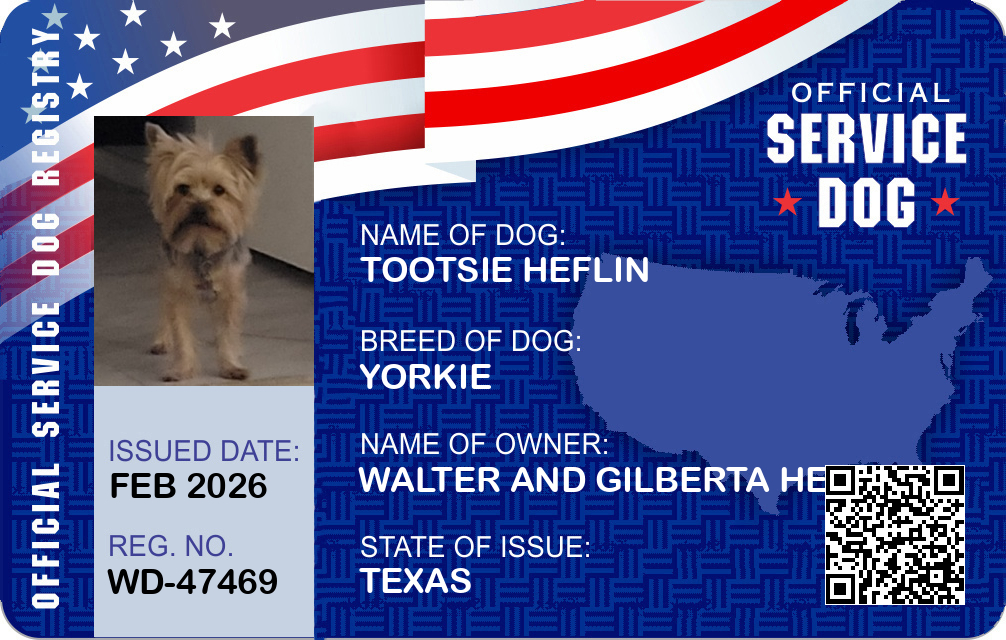Maltese as a Service Dog
Get Your Documents

The notion of utilizing the Maltese as a service dog might seem unconventional at first glance, given the breed’s dainty appearance and traditional role as a companion animal. However, with proper training and consideration, the Maltese can make a unique and capable service dog, particularly where size is an advantage.
Maltese Overview
Physical Characteristics
The Maltese, a member of the toy group, is one of the oldest dog breeds, cherished for centuries for its elegant, silky coat and diminutive size. Typically weighing between 4 to 7 pounds and standing about 7 to 9 inches tall at the shoulder, the Maltese is distinguished by its compact and graceful build. This small stature is a double-edged sword in the realm of service work.
Although their size restricts them from performing tasks requiring significant physical strength, such as mobility assistance, it allows them to accompany handlers in numerous environments without drawing unwanted attention. Their lightweight nature makes them perfect for individuals living in urban settings or those who require a small but effective service companion. Additionally, their hypoallergenic coat is an asset for those with pet allergies, making the Maltese a potentially excellent choice in this regard.
Temperament and Attitude
The temperament of the Maltese is one of its most compelling attributes when considering them for service work. Known for their intelligence and quick wit, Maltese dogs are highly trainable and possess a keen alertness, making them well-suited to specific service roles. Their gentle and affectionate demeanor helps establish a deep bond with their handlers, fostering an intuitive understanding necessary for service work.
In public or stressful environments, Maltese dogs typically remain poised and calm. Although some Maltese can be bark-prone, proper training can mitigate this tendency, transforming it into an asset by alerting handlers to specific situations. Their sociable nature makes them welcoming to various scenarios, but care must be taken to avoid overwhelming them, as their small size may make them more prone to stress in excessively busy surroundings.
Types of Service Work
When considering the Maltese for service work, it’s essential to align their natural talents with suitable tasks. While their size prohibits roles involving heavy lifting or physical support, the Maltese excels in areas such as:
- Medical Alert Service: Due to their keen sense of smell and heightened alertness, Maltese dogs can be trained to detect changes in their handler’s body chemistry, making them effective in alerting to medical conditions like low blood sugar for diabetic individuals or impending seizures.
- Psychiatric Service Work: The gentle and affectionate nature of the Maltese is ideal for offering comfort and reassurance to individuals with psychiatric conditions. Their intuitive ability to respond to emotional distress makes them excellent companions for those with anxiety or PTSD.
- Therapeutic Assistance: The Maltese excel as emotional support animals (ESAs), providing comfort and companionship to those needing emotional healing. Their small size allows them to accompany handlers in various settings, making therapy and emotional support accessible.
Health Considerations
While the Maltese presents many advantages as a service dog, potential health issues must be addressed. This breed is generally healthy, but like all dogs, they are prone to certain genetic conditions and potential health challenges, including:
- Dental Issues: Maltese dogs are especially prone to dental problems given their small mouth and dental overcrowding. Regular veterinary check-ups focusing on oral health are crucial to prevent complications that could disrupt their ability to perform service tasks efficiently.
- Luxating Patellas: A common issue in small breeds, luxating patellas affect the knee cap, causing discomfort or mobility issues. This condition could impact a Maltese service dog’s ability to perform its duties, and preventative care or surgical treatment might be necessary.
- Hypoglycemia: Small dogs, including the Maltese, are susceptible to low blood sugar, which can affect their energy levels and overall health. Maintaining a balanced diet with scheduled feeding times is integral for the health and consistent performance of a Maltese service dog.
Training and Suitability
The Maltese’s intelligence and eagerness to please make them particularly trainable. However, it’s essential to begin training early, as this breed benefits greatly from socialization and exposure to diverse environments to forestall behavioral issues such as separation anxiety or excessive barking.
Training a Maltese as a service dog involves positive reinforcement methods, focusing on tasks that leverage their keen senses and affectionate nature. Key considerations during training include:
- Consistent socialization to ensure comfort in public spaces
- Tailoring training to specific medical alert tasks or emotional support functions
- Ongoing reinforcement to maintain their service skills and obedience
Due to their adaptability and intelligence, Maltese dogs can excel with families or individuals who understand their unique needs and can provide consistent training and emotional support. Their specific roles often require a handler capable of investing time into maintaining their training and health.
Summary of Maltese
The Maltese might not be the archetypal service dog, but their unique attributes can be highly advantageous in specific roles:
- Strengths:
- Compact size for easy transport and accessibility
- Intelligent and highly trainable
- Affectionate and capable of providing emotional support
- Keen alertness for medical alerts
- Weaknesses:
- Prone to health issues such as dental problems and luxating patellas
- Limited physical capabilities for mobility assistance
- Potential for stress in overwhelming environments
- Ideal Service Roles:
- Medical alert services focusing on scent detection
- Psychiatric support with their capacity for emotional attunement
- Emotional support roles where companionship and comfort are paramount
In conclusion, while the Maltese may not fit all conventional service dog stereotypes, they possess qualities that, when leveraged appropriately, can make them exceptional aids in specific service capacities. Choosing a Maltese as a service dog entails a commitment to understanding their needs and strengths—an endeavor that, if pursued with care and dedication, can yield a fulfilling partnership.
Get Your Documents
Example State Cards













